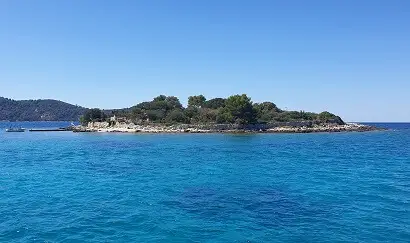If you’re planning a trip to the Balkans next summer, then you will want to make sure you are staying safe when you’re out on the beach or hiking in the countryside. You might be wondering: can you get sunburnt in Croatia?

Most of Croatia gets hot over the summer and has long, bright sunlight hours throughout the day. It is very possible that you can get sunburnt if you don’t take the right precautions, which is true almost everywhere you can go in Europe.
Read ahead to find out what you can expect from the sun when you’re in Croatia, and how to avoid getting sun-damaged skin.
What Causes Sunburn?
Before we get into the kind of sunshine that you will experience in the beautiful country of Croatia, we should first make sure to understand what actually causes sunburn in the first place. There are a lot of misconceptions about it, which can be pretty dangerous.
Sunburn is an inflammation of the skin that happens when the outer layers of your skin are exposed to UV (Ultraviolet) radiation, which is most commonly found in sunlight. It is a sign that your skin cells are being damaged, and it can even happen on a cloudy day. UV radiation is different from IR (Infrared) radiation, which is the “heat” that you feel from sunshine.
Up to 80 percent of the UV radiation that the sun produces can travel through clouds, particularly when they are thin.
One of the most important things to be aware of when you’re trying to avoid skin damage from the sun is not the heat or the amount of sunlight – it is the intensity of the UV radiation itself.
The UV index is a measurement out of 10 that describes how intense the UV radiation will be at a certain time, in a certain location. A high UV index means that you will burn faster and more severely.
What Are The Risks Of Sunburn?
The skin damage caused by UV radiation is a really significant risk, far beyond the discomfort and itchy redness that you might experience with a sunburn.
Even without burning, exposure to UV radiation increases your risk of developing skin cancer, which is the most common form of cancer in the world. In fact, statistics show that around 1 in 5 Americans will develop skin cancer before they reach the age of 70.
Skin cancer isn’t the only risk either. UV also causes skin aging which makes your skin less elastic, increases wrinkles, and causes roughness and dryness.
How High Is The UV Index In Croatia Over The Summer?
So, are you likely to experience a sunburn if you’re visiting Croatia? Let’s take a look at the UV index to see how high the risks actually are.
In Split, on the Adriatic Coast to the south of the country where temperatures are higher and there is more direct sunlight, the UV index can reach an 8 over the months of July and August. This demonstrates a very high health vulnerability from unprotected exposure to the sun.
This shouldn’t be too surprising, as this part of Croatia does get a lot of sun over the summer. On average, it will often be around 86 – 90° Fahrenheit (30 – 32° Celsius) in July or August all along the Mediterranean coastline, and there are rarely cloudy days.
Further north and further inland, the UV index can be lower, and it will be much lower over the winter months. However, the risk of getting a sunburn in the country is still high, and you should make sure that you are taking the right precautions to keep yourself safe.
How To Avoid Getting Sunburnt
To make sure that your skin stays as undamaged as possible, there are a number of important things that you should be doing. Remember: it doesn’t have to actually be hot and sunny for UV radiation to give you a sunburn.
- Cover up. The best thing that you can do is stop the sun from reaching your skin in the first place. It might be tempting to wear as little as possible in the hot weather, but loose fabrics can still be nice and cool while keeping your skin protected, and a hat with a wide brim is always a great choice to shade your face, ears, and neck.
- Stay in the shade. Make use of the shade as much as you can. While you aren’t completely protected from all UV, it does make a massive difference.
- Use the right sunscreen. Sunscreen is absolutely essential for when you are out in the sun at any point, but you need to make sure you are using the right stuff. Higher SPF offers more protection from UVB rays, but you also want a high UVA rating as well. A “broad spectrum” sunscreen is designed to protect against both UVA and UVB.
- Apply your sunscreen properly. Don’t forget to put a generous amount of sunscreen on all of your exposed skin and reapply it every two hours – or immediately after sweating or swimming.
Can You Buy Sunscreen In Croatia?
Considering the relatively strict rules and regulations about carrying liquids on a plane, you might find it hard to bring your favorite sunscreen with you, so can you get hold of some in Croatia?
It is very easy to buy sunscreen in Croatia and you will find it in most large grocery stores and even smaller corner shops, particularly near the beaches. It is best, however, to pick up your sunscreen from a pharmacy if you can so that you know it is high quality and properly formulated. There are many international brands available as well.
If you want to be super safe, you can always grab some from the airport before you leave.
Summary: Can You Get Sunburnt In Croatia?
So, can you get sunburnt in Croatia? You definitely can. It is possible for your skin to become sun-damaged in most European countries, particularly over the summer months. Croatia gets really sunny and the UV index can get very high, especially around the southern coastline.
Make sure to cover up, stick to the shade, and apply the right kind of sunscreen regularly while you are out there.
- The Top Restaurants Specializing in Truffle Dishes - August 10, 2023
- Truffle Panna Cotta: A Decadent Dessert Recipe for Truffle Lovers - August 7, 2023
- Truffle Scrambled Eggs: A Luxurious Breakfast Delight - August 7, 2023








